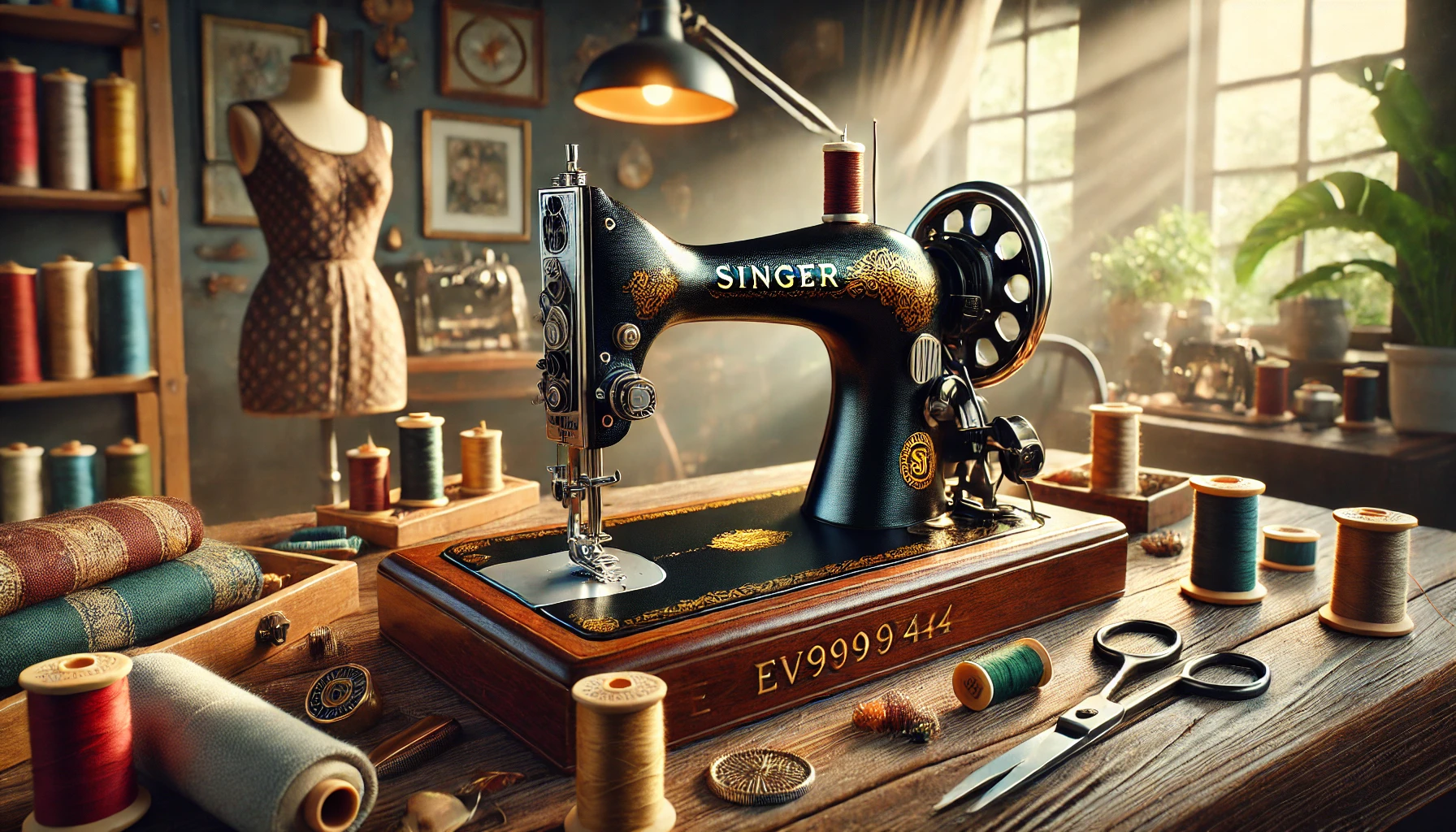Vintage sewing machines are more than just tools; they are pieces of history that have stood the test of time. Among the most revered models is the Singer 221K EV909542, a machine that has captured the hearts of sewing enthusiasts and collectors alike. Known for its precision, durability, and timeless design, the Singer 221K EV909542 is a testament to the ingenuity of early 20th-century engineering. This guide will explore the history, features, maintenance tips, and buying considerations of this iconic sewing machine, providing you with a comprehensive understanding of why the Singer 221K EV909542 remains a beloved choice for many.
Table of Contents
ToggleThe History of the Singer 221K EV909542: A Legacy of Excellence
The Singer 221K, often referred to as the “Featherweight,” was first introduced in 1933 by the Singer Manufacturing Company. The model quickly gained popularity due to its lightweight design, portability, and exceptional performance. The “EV909542” designation is part of the serial number, which helps identify the specific production run of the machine. Understanding the historical context of the Singer 221K EV909542 adds depth to its value, as it represents a period when sewing machines were becoming more accessible to the average household.
The Singer 221K was produced primarily in the United Kingdom at the Kilbowie factory in Clydebank, Scotland. The machine was designed to be compact, making it easy to transport and ideal for quilters and seamstresses who needed a reliable machine that could be taken to sewing classes or guild meetings. Despite its small size, the Singer 221K EV909542 is known for its robust construction and ability to handle a wide range of fabrics, from delicate silks to heavy woolens.
Key Features of the Singer 221K EV909542: What Makes It Stand Out
One of the most distinctive features of the Singer 221K EV909542 is its lightweight aluminum body, which contributes to its nickname, the “Featherweight.” Weighing just over 11 pounds, this machine is easy to carry and store, making it a favorite among quilters and those with limited sewing space. Despite its light weight, the Singer 221K EV909542 is a powerful machine, capable of producing precise stitches with consistent tension.
Another notable feature is the machine’s straight stitch mechanism. The Singer 221K EV909542 produces a perfect straight stitch, which is highly valued for quilting, piecing, and other sewing projects that require accuracy. The machine’s stitch length can be easily adjusted using the lever on the front, allowing for customization based on the fabric and project at hand.
The machine also features a unique bed extension that provides additional workspace when needed. This extension can be folded down when not in use, further enhancing the machine’s portability. The Singer 221K EV909542 comes with a range of accessories, including presser feet, bobbins, and a carrying case, all designed to enhance the user experience and provide versatility in sewing applications.
Maintenance and Care for Your Singer 221K EV909542: Ensuring Longevity
Proper maintenance is crucial for keeping your Singer 221K EV909542 in top working condition. Like any mechanical device, regular cleaning and lubrication are essential to prevent wear and tear and to ensure smooth operation. Fortunately, the Singer 221K EV909542 is relatively easy to maintain, even for those who are not mechanically inclined.
Start by regularly cleaning the machine to remove lint and dust that can accumulate in the bobbin area, feed dogs, and tension discs. Use a small brush or compressed air to reach into tight spaces. It’s also important to periodically oil the machine at the designated points indicated in the user manual. Using sewing machine oil, apply a small drop to each point to keep the internal components running smoothly.
In addition to regular cleaning and oiling, it’s essential to check the machine’s tension settings, needle condition, and thread quality. Using a dull or bent needle can damage your fabric and cause skipped stitches, so be sure to replace the needle regularly. Similarly, using low-quality thread can lead to thread breakage and tension issues, so opt for high-quality threads that match your project.
Troubleshooting Common Issues with the Singer 221K EV909542
Even with regular maintenance, you may encounter some common issues with your Singer 221K EV909542. Fortunately, most of these problems can be easily resolved with a bit of troubleshooting. One common issue is skipped stitches, which can be caused by several factors, including a dull needle, incorrect needle size, or improper threading. To fix this, start by replacing the needle with a new one and ensuring it is correctly installed. Next, rethread the machine, making sure the thread is properly seated in the tension discs and take-up lever.
Another common issue is tension problems, which can result in uneven stitches or puckering of the fabric. Tension issues can often be resolved by adjusting the tension dial on the machine. Start with a lower tension setting and gradually increase it until the stitches are balanced and even on both sides of the fabric.
If your machine is making unusual noises or the handwheel feels stiff, it may be a sign that the machine needs to be lubricated or that a part is loose. Refer to the user manual for lubrication points and check all screws and bolts to ensure they are tight. If the problem persists, it may be worth taking the machine to a professional for servicing.
Buying a Singer 221K EV909542: What to Look For
If you’re in the market for a Singer 221K EV909542, there are several factors to consider to ensure you’re getting a quality machine. First, it’s important to verify the machine’s serial number to confirm its authenticity and production date. The serial number, which includes the “EV909542” designation, can be found on the underside of the machine and should match the records provided by Singer.
When inspecting the machine, check for any signs of wear or damage, particularly in the moving parts such as the handwheel, bobbin winder, and presser foot lever. The machine should operate smoothly, with no excessive noise or resistance. Pay close attention to the condition of the bed extension and the machine’s overall finish, as these can indicate how well the machine has been cared for over the years.
It’s also important to inquire about the machine’s accessories and whether they are original or replacements. Original accessories, such as the presser feet, bobbins, and carrying case, can add to the machine’s value and functionality. If possible, test the machine on a piece of fabric to ensure it produces even, consistent stitches.
Restoring a Singer 221K EV909542: Bringing New Life to a Classic
Restoring a vintage Singer 221K EV909542 can be a rewarding project, allowing you to bring new life to a classic piece of sewing history. Whether you’ve inherited a machine that’s been in storage for years or purchased one at a flea market, there are several steps you can take to restore it to its former glory.
The first step in restoration is a thorough cleaning. Disassemble the machine as much as possible, removing the needle, presser foot, bobbin case, and other removable parts. Clean each part individually, using a mild soap and water solution for the exterior surfaces and a degreaser for the internal components. Be sure to dry each part thoroughly to prevent rust.
Next, assess the machine for any damaged or missing parts. Replacement parts for the Singer 221K EV909542 are readily available online or through specialty sewing machine shops. Common replacement parts include the needle plate, bobbin case, and tension assembly. If you’re not comfortable replacing parts yourself, consider taking the machine to a professional for repair.
Once the machine is clean and any necessary repairs have been made, it’s time to lubricate the moving parts. Apply a small amount of sewing machine oil to the designated points, taking care not to over-oil the machine, as excess oil can attract dust and lint. After lubrication, test the machine by running it without thread to ensure all parts are moving smoothly.
Finally, polish the exterior of the machine to restore its shine. Use a soft cloth and a mild polish designed for metal surfaces. If the machine has any decals or decorative elements, take care not to damage them during the polishing process.
Using the Singer 221K EV909542: Tips for Quilters and Seamstresses
The Singer 221K EV909542 is particularly popular among quilters, thanks to its precise stitching and portability. Whether you’re a seasoned quilter or new to the craft, there are several tips that can help you get the most out of your machine.
First, invest in a quality 1/4-inch presser foot, which is essential for achieving accurate seam allowances in quilting. The Singer 221K EV909542 can accommodate various presser feet, so be sure to use the correct one for each project. Additionally, consider using a straight stitch plate, which has a smaller needle hole and helps prevent the fabric from being pulled into the machine.
When piecing quilt blocks, use a consistent stitch length, typically around 2.0 to 2.5 mm. This will ensure your seams are strong and even. If you’re working with thicker fabrics or multiple layers, you may need to adjust the stitch length slightly to accommodate the additional bulk.
Another tip for quilters is to take advantage of the machine’s portability. The Singer 221K EV909542’s compact size makes it easy to take to quilting classes, retreats, or guild meetings. Be sure to pack all necessary accessories, including extra bobbins, needles, and thread, so you’re prepared for any project.
For seamstresses, the Singer 221K EV909542 offers versatility in garment construction. The machine’s precise straight stitch is ideal for sewing seams, hems, and topstitching. When working with delicate fabrics, use a fine needle and lightweight thread to avoid damaging the fabric. For heavier fabrics like denim or canvas, opt for a stronger needle and a heavier thread to ensure durable seams. The machine’s adjustable stitch length allows you to customize your stitching for various fabric types, making it a versatile tool for garment construction.
If you’re sewing garments, it’s also important to pay attention to the machine’s tension settings. Different fabrics may require different tension adjustments to achieve the best results. For instance, when working with knits, you may need to lower the tension slightly to prevent the fabric from stretching out of shape. Conversely, for tightly woven fabrics, increasing the tension can help create clean, crisp stitches.
For more advanced sewing projects, the Singer 221K EV909542 can also be used for creating buttonholes, although it requires manual manipulation since the machine lacks a built-in buttonhole function. With practice, however, you can achieve professional-looking buttonholes by carefully measuring and marking the placement, then sewing closely spaced zigzag stitches. While the machine primarily excels at straight stitching, experienced users can achieve a surprising range of techniques with creativity and practice.
The Collectible Value of the Singer 221K EV909542
The Singer 221K EV909542 is not just a functional tool but also a collector’s item. Many sewing enthusiasts collect vintage Singer machines due to their historical significance, craftsmanship, and aesthetic appeal. The 221K, in particular, is highly sought after, especially when it is in good working condition and includes original accessories.
Several factors contribute to the collectible value of a Singer 221K EV909542. One key factor is the machine’s condition. Machines that have been well-maintained, with minimal wear and original parts, tend to fetch higher prices on the collector’s market. The presence of original accessories, such as the carrying case, instruction manual, and extra presser feet, also adds to the machine’s value.
The machine’s serial number, particularly the “EV909542” designation, can also impact its value, as it helps determine the production date and factory location. Machines with unique serial numbers or those from specific production runs may be more valuable to collectors.
The aesthetic condition of the machine is another important consideration. Machines with intact decals, shiny finishes, and no rust or corrosion are more desirable to collectors. Some collectors also appreciate machines with a unique history or provenance, such as those that were used in a famous sewing school or by a well-known seamstress.
For those looking to sell their Singer 221K EV909542, it’s essential to do some research to determine the machine’s current market value. Online auction sites, vintage sewing machine forums, and specialty antique shops can provide insights into what similar machines are selling for. It’s also a good idea to take clear, detailed photos of the machine and any accessories to present it in the best possible light to potential buyers.
Why the Singer 221K EV909542 Remains a Favorite Among Sewing Enthusiasts
There are several reasons why the Singer 221K EV909542 continues to be a favorite among sewing enthusiasts, even decades after its initial production. One of the primary reasons is its reputation for durability and reliability. Unlike many modern machines that rely on plastic parts, the Singer 221K EV909542 is constructed almost entirely of metal, making it incredibly robust and long-lasting.
The machine’s precise straight stitch is another reason for its enduring popularity. Whether you’re quilting, sewing garments, or working on home decor projects, the Singer 221K EV909542 delivers consistent, high-quality stitches that stand the test of time. This level of precision is particularly valued by quilters, who require exact seam allowances for their projects.
Portability is another key factor in the machine’s appeal. Weighing just over 11 pounds, the Singer 221K EV909542 is easy to transport to sewing classes, retreats, or guild meetings. Its compact size also makes it an ideal choice for those with limited sewing space or for anyone who needs a reliable machine that can be easily stored when not in use.
Moreover, the Singer 221K EV909542 is beloved for its simplicity. Unlike modern computerized machines that come with a dizzying array of features and settings, the 221K is straightforward and easy to use. This makes it an excellent choice for beginners who are just learning to sew, as well as for experienced sewists who appreciate the machine’s focus on quality over quantity of features.
Finally, the machine’s classic design and vintage charm add to its allure. With its sleek black finish, gold decals, and shiny metal parts, the Singer 221K EV909542 is as much a decorative piece as it is a functional tool. Many owners proudly display their machines in their sewing rooms or homes, enjoying the blend of beauty and utility that the machine represents.
Read More: Numberlina.com: Your Ultimate Hub for Number Crunching and Data Analysis
Conclusion: The Enduring Legacy of the Singer 221K EV909542
In a world where technology is constantly evolving, the Singer 221K EV909542 stands out as a testament to timeless craftsmanship and design. This vintage sewing machine has earned its place in the hearts of sewing enthusiasts and collectors around the world, thanks to its durability, precision, and classic aesthetic.
Whether you’re a quilter, a garment maker, or a vintage sewing machine collector, the Singer 221K EV909542 offers a unique combination of functionality and history. By understanding its features, maintaining it properly, and appreciating its collectible value, you can ensure that this iconic machine continues to serve you well for many years to come.
In the end, the Singer 221K EV909542 is more than just a sewing machine—it’s a piece of history that connects us to the rich legacy of sewing craftsmanship. Whether you’re using it to create beautiful quilts, stylish garments, or simply enjoying it as a collectible, the Singer 221K EV909542 remains a beloved and cherished part of the sewing world.



